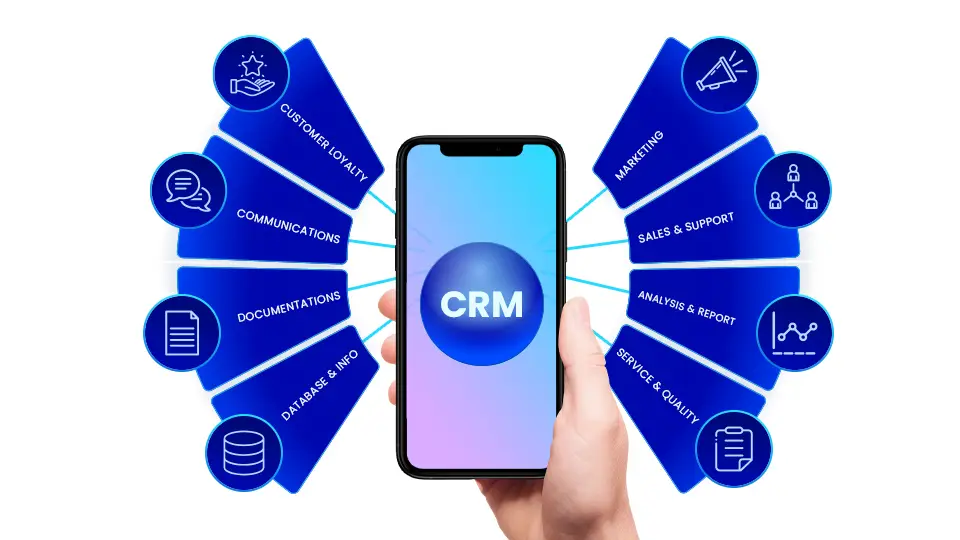- Admin@nettyfish
- benefits of crm, crm for small business, crm platform, crm software, crm software companies in chennai, crm software examples, what is crm integration
- 0 Comments
- 38211 Views
In today’s competitive business world, maintaining strong customer relationships is supreme for success. Customer Relationship Management (CRM) tools have emerged as essential platforms that help businesses effectively manage interactions, streamline processes, and drive growth. However, as businesses expand and adopt multiple software solutions, the need for seamless integration of CRM systems becomes increasingly important. This blog explores the concept of CRM integration, its benefits, and its significance for businesses of all sizes.
Understanding CRM Integration
CRM integration refers to the process of connecting a CRM platform with other software applications, databases, or tools used within an organization. The goal is to enable the flow of data and information between these systems, creating a unified and comprehensive view of customer interactions, transactions, and preferences. By integrating CRM software with other systems, businesses can eliminate data silos, enhance collaboration, and make informed decisions based on a holistic view of customer data.
Benefits of CRM Integration

Enhanced Customer Insights: Integrating CRM with other systems allows businesses to gather comprehensive customer data from various touchpoints. This results in a deeper understanding of customer preferences, behaviors, and needs, enabling personalized interactions and targeted marketing efforts.
Streamlined Processes: CRM integration automates the exchange of data between different systems, eliminating the need for manual data entry. This streamlines processes, reduces errors, and saves valuable time for employees.
360-Degree Customer View: Integrating CRM with systems such as sales, marketing, and customer support provides a complete view of the customer journey. This enables teams to deliver consistent and personalized experiences throughout the entire lifecycle.
Efficient Communication: Integration ensures that all departments have access to the same up-to-date customer information. This fosters efficient communication and collaboration, leading to better customer service and issue resolution.
Data Accuracy: Integrating CRM with other systems reduces the risk of data duplication and inconsistencies. This promotes data accuracy and maintains the integrity of customer information.
Real-Time Updates: Integrated systems offer real-time updates, ensuring that employees have access to the latest customer data. This is crucial for timely decision-making and proactive customer engagement.
Examples of CRM Software Integration
Marketing Automation Integration: Integrating CRM with marketing automation platforms enables seamless lead tracking, scoring, and nurturing. This ensures that sales teams receive qualified leads and marketing efforts are aligned with sales goals.
E-commerce Integration: Integrating CRM with e-commerce platforms allows businesses to track customer purchasing behaviors, preferences, and history. This data informs personalized marketing strategies and enhances customer retention.
Customer Support Integration: Integrating CRM with customer support systems provides support agents with a comprehensive view of customer interactions, enabling efficient issue resolution and improved customer satisfaction.
ERP Integration: Integrating CRM with Enterprise Resource Planning (ERP) systems facilitates the seamless flow of information between sales, inventory, and financial operations, leading to better inventory management and order fulfillment.
Choosing the Right CRM Integration Strategy
Selecting the appropriate CRM integration strategy depends on the specific needs and goals of the business:
Pre-Built Integrations: Many CRM software companies offer pre-built integrations with popular applications such as email marketing, social media, and e-commerce platforms. These integrations are relatively easy to set up and provide immediate benefits.
Custom Integrations: For businesses with unique requirements, custom integrations can be developed to connect CRM with proprietary or industry-specific software.
Middleware Solutions: Middleware solutions act as intermediaries between different systems, facilitating data exchange. They are ideal for businesses with complex integration needs.
API Integration: Application Programming Interfaces (APIs) allow businesses to build custom connections between systems. This provides flexibility and control over the integration process.
Conclusion
CRM integration is a strategic initiative that empowers businesses to harness the full potential of their CRM software. By connecting CRM platforms with other software applications, businesses can unlock a wealth of benefits, including enhanced customer insights, streamlined processes, and improved collaboration. Whether through pre-built integrations, custom solutions, or middleware, the right integration strategy depends on the organization’s unique requirements. As CRM software companies in Chennai and beyond continue to innovate, businesses have the opportunity to create a unified ecosystem that drives growth, enhances customer experiences, and propels them toward long-term success.
Read Our Related Articles:
- Empower Your Business with Missed Call Services
- Power of AI in Sales
- Best IVR Service Provider in Chennai

Best IVR Service Provider in Chennai





